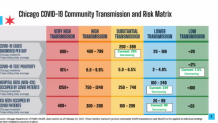In line with the state of Illinois, Chicago will lift its indoor mask mandate early next week in certain public locations, as long as coronavirus metrics continue on a downward trend, officials announced Tuesday.
Chicago Mayor Lori Lightfoot said in a press conference that the mask mandate, as well as the city's vaccine requirement, will end Feb. 28 at a number of spots across the city, citing a drop in key COVID-19 metrics.
“Based on key data, it looks as if the worst of the Omicron surge is behind us and we will be able to safely remove these emergency measures instituted to protect the health and safety of our residents,” Lightfoot said.
According to Lightfoot, masks will continue to be required in health care settings, on public transit and in other congregate settings, per federal mandates and guidance from the Centers for Disease Control and Prevention.
Feeling out of the loop? We'll catch you up on the Chicago news you need to know. Sign up for the weekly Chicago Catch-Up newsletter here.
The mayor called the move a "huge step forward" in Chicago's fight against the coronavirus pandemic, adding that the city wouldn't have been able to make Tuesday's announcement "even a few weeks ago."
Though the vaccine mandate is on track to be lifted for indoor businesses next week, Lightfoot noted that city workers must continue to be vaccinated against the virus to work for Chicago.
Chicago Department of Public Health Commissioner Dr. Allison Arwady said that three out of four key coronavirus metrics, including test positivity, hospital bed capacity and ICU bed capacity, have moved into the "lower transmission" category or below as of Monday.
Local
Though these metrics indicate that the city is able to lift some COVID mitigations, the city's top doctor reminded that the the pandemic is not over.
“This doesn’t mean COVID is gone, it simply means transmission levels are lower than they have been during surges," Arwady said. "I still encourage people to take precautions and definitely get vaccinated to protect yourself and your loved ones.”

Arwady explained that city health officials have been relying on a set of metrics to determine when restrictions can be lifted, including that three out of four key metrics must be met to move forward with easing restrictions.
The metrics include test positivity, hospital beds occupied by COVID patients, ICU beds occupied by COVID patients and daily COVID cases. The seven-day rolling averages for each category need to be at a "lower transmission" level, which is set by the Centers for Disease Control and Prevention.
City officials previously said that once three of the preceding four metrics hit at least the “lower transmission” level, a two-week clock, known as an “incubation cycle” will start.
Though Chicago won't have remained in the "lower transmission" rate for the full two weeks by Feb. 28, city officials have noted that mitigations could still safely be lifted prior to the end of the "incubation cycle."
CDPH data showed that Chicago was averaging 283 COVID cases per day, which is a 37% drop from last week. Hospitalizations fell 29% over the last seven days, sitting at about 27 per day related to the coronavirus.
Deaths in Chicago are down 51% from last week and the city's positivity rate dropped from 2% to 1.5% of the past week, CDPH date showed.
Until next week, Chicago has a mask mandate in place for indoor settings, along with a requirement that patrons in specific indoor establishments show a proof of COVID vaccination in order to gain entry.
Illinois aims to lift its mask mandate, with the exception of in schools, by Feb. 28 if state COVID metrics continue to decline, as well.
Adding that the state is "seeing the fastest rate of decline in our COVID-19 hospitalization metrics since the pandemic began," Gov. J.B. Pritzker said if trends continue as expected, "then on Monday, Feb. 28, we will lift the indoor mask requirement for the State of Illinois."
He noted, however, one important caveat.
"I want to be clear: Many local jurisdictions, businesses and organizations have their own mask requirements and other mitigations that must be respected," he said. "Having stricter mitigations than the state requirements is something that must be adhered to."



